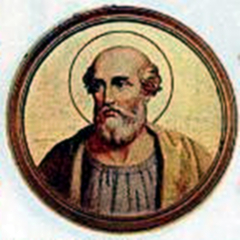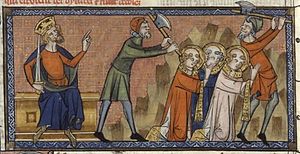We know from history that the Greeks had never good relations or any connections with the papacy in Rome. The reasons for that are many.
- The popes promoted the latin rite using the latin language
- The Greeks were under the political authority of the Eastern Roman empire(Byzantine) which promoted the patriarchate of Constantinople.
- The Popes had bad relations with the emperors of the east contesting over the Roman legacy and the right to use it.
- The pretext for the official break up of the east and the west were the dogmatic differences and the high point of this conflict was the sack of Constantinople by the crusaders in 1204.
Although Greeks had bad relations with the Papacy there were two periods in history where the Popes had Greek background. The first period was in the early stages of christianity when those who were appointed as bishops of Rome were either coming from the Greek community of Rome or were immigrants from the hellenistic east. The second was the period after Jutinian's conquests when Byzantium controlled for at least a century Rome and other regions of the Italian peninsula. At this period the emperors of the east promoted the appointment of Greek popes.
To begin with the very word 'pope' is Greek, meaning 'father' .
Early Christian period.
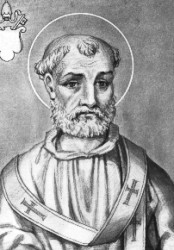 |
| Saint Anacletus the second pope of Rome |
St. Anacletus (Cletus) (+ c. 91), by origin a Greek from Athens and possibly a martyr. His name, correctly Anencletus, means 'blameless' (see Titus 1,7) and he may originally have been a slave. Feast: 26 April.
He was the second pope in history succeeding pope Linus who although he had a Greek name according to the archives of the Vatican he was from Tuscany.
 |
| Saint Evaristus the fifth pope |
St. Evaristus (+ c. 109), perhaps a martyr and almost certainly of Hellenic/Jewish origin. Feast: 26 October.
He was the fifth pope and held the office for eight years.He was the son of hellenized Jews from Bethleem.
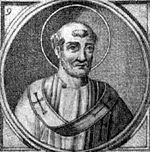 |
| Saint Telesphorus. The seventh pope |
St Telesphorus (+ c. 136), a martyr. Feast: 5 January (in the East 22 February).
He was the seventh pope. He was born in Greece
St. Hyginus (+ c. 142). Feast: 11 January.
He was born in Athens and initially he was a philosopher.
 |
Saint Soter
He was born in Fondi of Campania. His name betrays his Greek descent. |
St. Soter (+ 174), of Greek descent, he may have been martyred. Feast: 22 April.
 |
| Pope Eleutherius . His name means free in Greek. |
St. Eleutherius (+ 189), Greek, possibly martyred. Feast: 26 May.He was born in Nicopolis in Epirus.
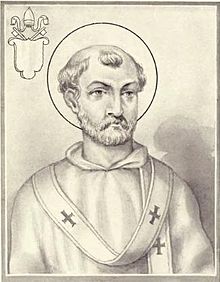 |
| Pope Antherus(Anterus). The epitaph of his grave was written in Greek letters. |
St. Antherus (+ 236), Greek and perhaps martyred. Feast: 3 January (5 August in East).
St. Sixtus II (+ 258), an Athenian. He was a good and peace-loving man' who was much helped by Dionysius, Bishop of Alexandria. He was martyred by beheading, together with his seven deacons, one of whom was St Lawrence. He was and is greatly venerated in the Orthodox Church, West and also East. Feast: 7 August (10 August in the East).
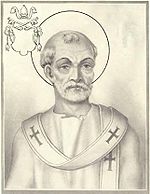 |
| Saint Eusebius. The thirtieth pope |
St. Eusebius (+ 310), the thirtieth pope and a Greek by origin. He was deported to Sicily by the Emperor and died there as a confessor. Feast: 17 August.
 |
| Pope Zosimus. the fortieth pope. |
St Zosimus (+ 418), the fortieth Pope, by origin a Greek. Although initially he made many errors of tact and judgement, he was anti-pelagian. Feast: 26 December.
The period of Byzantine Rome
St. Agatho (+ 681), Sicilian of Greek origin. Preceded by two popes who are not saints, he was a kindly and generous man, who also helped call the Sixth Oecumenical Council and helped end monotheletism. Feast: 10 January (20 February in the East).
St. Leo II (+ 683), Sicilian, possibly of Greek descent. He confirmed the condemnation of a predecessor, the heretical Pope Honorius I (+ 638), who had fallen into the monothelite heresy. He loved the poor and was also much concerned with church music. Feast: 3 July.
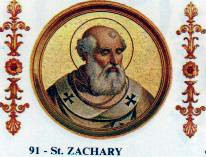 |
| Pope Zachary |
St Zacharias (+ 752), a Greek and the last Orthodox saint in this see, he opposed iconoclasm, adorned churches with frescos, and did much for missionary work and peace all over western Europe. Feast: 15 March. He was the last "Greek" pope. His successor facing the Lombard threat turned towards the Franks as the Byzantines were busy fighting in two fronts the Bulgars and the Arabs of the Abassid caliphate.
The iconoclasm in Byzantium and the coronation of Charlemagne as emperor of Rome worsened even more the relations beween he pope and the emperors of the East. This lead to the final schism two centuries later in 1081.
images source: wikipedia
source:orthodoxengland.com









